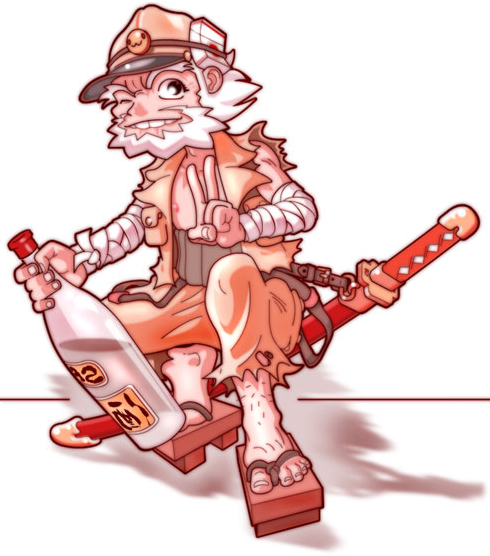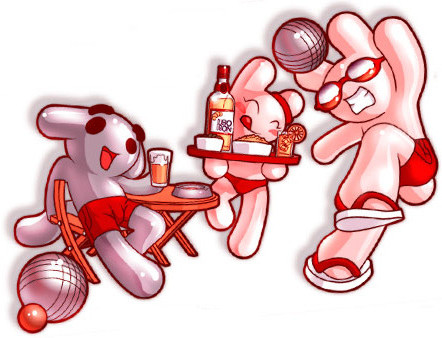History
First years
 Old Senseï / © 2003 MékoStudio Tanuki is a group of freelance illustrators and developers founded in July 2000 by Méko, Utku, Nico and Karim in Lyon, France. They create web animated films, games and websites on customers requests (Tanuki Design) or for their own productions (Studio Tanuki) that are mostly inspired by japanese pop culture. Studio Tanuki first notable productions are made with Macromedia Flash technology for two web games (StripPoker Club and Minami Hamazaki DatingSim) and a short animated film (Pinpin Lelapin).
Old Senseï / © 2003 MékoStudio Tanuki is a group of freelance illustrators and developers founded in July 2000 by Méko, Utku, Nico and Karim in Lyon, France. They create web animated films, games and websites on customers requests (Tanuki Design) or for their own productions (Studio Tanuki) that are mostly inspired by japanese pop culture. Studio Tanuki first notable productions are made with Macromedia Flash technology for two web games (StripPoker Club and Minami Hamazaki DatingSim) and a short animated film (Pinpin Lelapin).
After the departure of Karim in 2002, nicodeux joins Studio Tanuki as a developer and starts adding client-server and database assets, extending what was doable with the sole Flash front-end. This enables game progression to be saved, especially in Minami Hamazaki DatingSim and lays ground to the realisation of a homemade discussion board that mixes community management and game progression/awards. The players community around Minami Hamazaki DatingSim thus quickly raises to thousands of players worldwide though mostly with french speaking people because the game lacks translation. A few events are set in 2003 and 2004 during week ends for Minami Hamazaki DatingSim players to gather in Paris or Cannes in the French Riviera, creating a strong fan base of Studio Tanuki's work.
The notoriety of Studio Tanuki reaches a first summit in 2003 when Pinpin Lelapin wins an award in the Annecy International Festival of Animated Film and in 2004 when Méko, Utku, Nico and nicodeux are asked to be part of the jury of the Web Flash Festival hosted in Paris dedicated to web games and short animated films made using Macromedia Flash.
 Tanukishi Zero / © 2003 Méko
Tanukishi Zero / © 2003 Méko
Split in two entities
However, the team decides to separate in 2004: Utku and Nico create "Les Tanukis" to focus on productions for customers like what previously was "Tanuki Design", while Méko and nicodeux keep "Studio Tanuki" to pursue creations around japanese pop culture and their fans community. At this time, Les Tanukis register "DatingSim" as a trademark to develop the game concept as a commercial product with a second version of the game titled "Lovely Juliet" that is progressively released in chapters.
 Bunny Maloney and friends / © 2003 Méko - MoonScoop
Following the split between the two entities, MagicalTux and Bollzy join Studio Tanuki bringing respectively IT infrastructure and community management skills. In late 2004, Méko and nicodeux launch MangaPOP, a website for a community of artists around japanese pop culture under the Studio Tanuki banner. MangaPOP holds booth in several festivals: Tokyo International Anime Fair (2005), Japan Expo (2005, 2006 & 2007), Paris Manga (2006 & 2007). The interest around MangaPOP can especially be seen during the 2006 edition of Japan Expo in Paris where MangaPOP holds a large booth with several activities for attendees like drawing contests, japanese pop culture goodies and master classes from guest mangakas.
Bunny Maloney and friends / © 2003 Méko - MoonScoop
Following the split between the two entities, MagicalTux and Bollzy join Studio Tanuki bringing respectively IT infrastructure and community management skills. In late 2004, Méko and nicodeux launch MangaPOP, a website for a community of artists around japanese pop culture under the Studio Tanuki banner. MangaPOP holds booth in several festivals: Tokyo International Anime Fair (2005), Japan Expo (2005, 2006 & 2007), Paris Manga (2006 & 2007). The interest around MangaPOP can especially be seen during the 2006 edition of Japan Expo in Paris where MangaPOP holds a large booth with several activities for attendees like drawing contests, japanese pop culture goodies and master classes from guest mangakas.
Under Studio Tanuki banner, Méko and MagicalTux release in 2006 Kanami-Chan, a Flash game for learning japanese katakana and hiragana.
Notable Works and awards
Released works

Strip Poker Club : Strip Poker Club is a game made with Macromedia Flash where the player has a limited amount of coins at the start of each game in order to beat one amongst three female opponents in a poker cards game. Everytime the computer controlled opponent looses a turn, she removes one layer of cloth until being fully naked or the player being out of coin, both cases ending the game. At time of release, Strip Poker Club stands out from similar games by the use of professional handcraft drawings, a manga atmosphere and the possibility to save the game and later reload the game in the state it was left.

Pinpin Lelapin : "Pinpin Seigi Sentaï - l'Attaque du Poulpe Rouge Géant" is a short animated film made using Macromedia Flash technology for most of the drawings and animations and released in 2002. The movie relates the parodist adventures of three heroes called to the rescue of a city invaded by a gigantic red octopus robot that seems unaffected by usual military attacks. The three heroes, three bunnies with the help of their mysterious leader, use their own gigantic robot to defeat the invader. Pinpin Lelapin wins the Audience Award at the 2003 edition of the prestigious Festival International du Film d'Animation d'Annecy and gets attention from professional media. In 2005 the "Pinpin Lelapin" licence is acquired by France Animation / MoonScoop and renamed "Bunny Maloney" for a computer-animated television series of 52 episodes broadcasted in 2009 and 2010, in France and the United Kingdom.

Minami Hamazaki DatingSim : Released in 2002, Minami Hamazaki DatingSim is a game made with Macromedia Flash technology. The main game character, a young student in highschool, has two months to seduce and date the most beautiful girl of his school. The player has to manage two main resources, time and money, in order to progress during each game day by increasing his stats through work, study, sports or shopping in the city where he and Minami live. In the first version of the game, Minami must be seduced during a single session. A second version of the game introduces save and resume of game progress along with players scores storage and ranking. This second version comes with social tools (forum, players ranking, "friendship" links between players and private messaging) that strengthen the player base and increases re-playability while Minami Hamazaki DatingSim gets many positive reviews and critics from press.

MangaPOP : Launched in 2004, MangaPOP is a community portal website for artists, mostly evolving around the japanese pop culture and manga drawing style but open to other artistic styles. It features two levels of users: "member" and "artist"s", both can display a profile page but artists also have the possibility to create galleries of their artworks. Social interactions are encouraged through the use of "heart" (love) buttons, private messaging and friendship relations. The community grows steadily but slowly in size over the years through the participation in several festivals and fairs around the manga culture, with a core of french artists but also foreign ones, especially japanese.

Kanami-Chan : Released in 2006, Kanami-Chan is a game made with Macromedia Flash that trains players to learn and remember japanese characters hiragana and katakana with the help of Kanami, a girl with a kawaï design.
Aborted projects

Pulipuli Prickle Princess : This project was intended to be a turn based strategy game made with Macromedia Flash, inspired by the Advance Wars franchise. The player was to play young girls with strong character design and acting as leader for an army with units evolving on a bee nest like board. Most of the princesses were designed and a first playable board was made before the project was dropped due to lack of internal resources.

Ujimushiro : Conceived as an animated web series, Ujimushiro should have told the story of a cute white maggot eating dead corpses. The concept aimed to find the subtle balance between ugly and funny elements in the animations, but the project never went beyond concept phase due to lack of internal resources.

Yokaï Monsters : Intended as a web animated series, Yokaï Monsters should have told the stories of folkloric japanese monsters known as Yokaï. The project never went past design phase.






